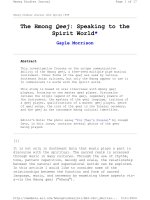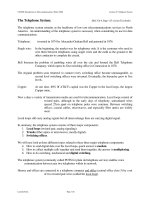Tài liệu Stephen King - The Plant 3 doc
Bạn đang xem bản rút gọn của tài liệu. Xem và tải ngay bản đầy đủ của tài liệu tại đây (286.9 KB, 43 trang )
T h e P l a n t
by Stephen King
part three of a novel in progress
p h i l t r u m p r e s s
Bangor, Maine
Copyright © 1983,1985, 2000,byStephenKing.All rightsreserved.
S Y N O P S I S
JOHN KENTO N , who majored in English and was President of the Brown University
Literary Society, has had a rude initiation into the real world as one of Zenith House’s
four editors. Zenith House, which captured only 2% of the total paperback market the
year before (1980), is dying on the vine. All of its employees are worried that Apex, the
parent corporation, may soon take extreme measures to stem the tide of red ink...and
the most likely possibility is looking more and more like terminating Zenith House,
with extreme sanction. The only hope is a drastic sales turnaround, but with Zenith’s
tiny advances and creaky distribution system, that seems unlikely.).
Enter CARLOS DETWEILLER, first in the form of a query letter received by John
Kenton. Detweiller, twenty-three, works in the Central Falls House of Flowers, and is
hawking a book he’s written called True Tales of Demon Infestations. Kenton, with the vague
idea that Detweiller may have some interesting stuff which can be rewritten by a
staffer, encourages Detweiller to submit sample chapters and an outline. Detweiller
instead submits the entire manuscript, along with a bundle of photographs. The mss is
even more abysmal than Kenton—who thought the book could maybe be juiced up
for The Amityville Horror audience—would have believed in his worst nightmares. Yet
the worst nightmare of all is contained in the form of the enclosed photographs. Most
are shots of painfully faked seance effects, but four of them show a gruesomely realis-
tic human sacrifice, in which an old man’s heart is being pulled from his gaping
chest...and it seems very likely to Kenton that the fellow doing the pulling is none
other than Carlos Detweiller himself.
ROGER WA D E concurs with Kenton’s feeling that they have stumbled into some-
thing which is probably a police matter—and a very nasty police matter at that.
Kenton takes the photos to S G T. T Y N DA L E , who wires them to CHIEF IVERSON
in Central Falls. Carlos Detweiller is arrested, then released when an officer assigned to
surveillance sees the photos in question and remarks that he saw the so-called “sacri-
fice victim” sitting in the House of Flowers office that very day, playing solitaire and
watching Ryan’s Hope on TV.
Tyndale tries to comfort Kenton. Go home, he says, have a drink, forget it. You
made a perfectly forgivable mistake in the course of trying to do your civic duty.
Kenton burns the “sacrifice photos,” but he can’t forget; he receives a letter from
the obviously insane Carlos Detweiller, promising revenge. Two weeks later, he
receives a letter from one “Roberta Solrac,” who purports to be a great fan of Zenith’s
second-hottest author, Anthony La Scorbia (La Scorbia is responsible for a series of
nature-run-amok novels such as Rats from Hell, Ants from Hell, and Scorpions from Hell).
“She” claims to have sent La Scorbia roses, and wants to send Kenton, as La Scorbia’s
editor, a small plant “as a token of esteem.”
Kenton, no fool, realizes at once that Solrac is Carlos spelled backward...and
Detweiller, of course, worked in a greenhouse. Convinced that the “token of esteem”
is apt to be something like deadly nightshade or belladonna, Kenton sends an interof-
fice memo to Riddley, instructing him to incinerate any package which comes to him
from a “Roberta Solrac.”
RIDDLEY WA L K E R , who respects Kenton more than Kenton himself would ever
believe, agrees, but privately adopts a wait-and-see attitude. Near the end of February
1981, a package from “Roberta Solrac,” addressed to John Kenton, actually does arrive.
Riddley opens the package in spite of a strong feeling that the sender—Detweiller—is
a terribly evil man. If so, the contents of the package are hardly in keeping with such
notions; it is nothing more than a sickly-looking Common Ivy with a little plastic sign
stuck into the earth of its pot. The sign reads:
H I !
M Y N A M E I S Z E N I T H
I A M A G I F T T O J O H N
F R O M R O B E R T A
Riddley puts it on a high shelf of his janitor’s room and forgets it.
For the time being.
February 25
Dear Ruth,
I’ve got a case of the mean reds, so I thought I’d pass some of them on—
see the enclosed Xeroxes, concluding with a typically impudent communi-
cation from Riddley, he of the coal-black skin and three hundred huge
white teeth.
You’ll notice that Roger kicked my ass good and hard—not much like
Roger, and doubly sobering for that very reason. I don’t think one has to be
very paranoid to see that he’s talking about the possibility of firing me. If I’d
talked this out with him over martinis at Flaherty’s after work, I doubt very
much if he would have come down so hard, and of course I had no idea he
was waiting on a call from Enders. I undoubtedly deserved the ass-kicking I
got—I haven’t really been doing my job—but he has no idea of the scare
that letter threw into me when I realized it was Detweiller again. I’m too
goddam thin-skinned for my own good, that’s what Roger thinks...but
Detweiller is scary for other, less easily grasped reasons. Being the idée that’s
gotten fixe in some crazy’s head has got to be one of the most uncomfortable
feelings in the world—if I knew Jody Foster, I think I’d give her a jingle and
tell her I know exactly how she feels. There’s an almost palpable texture of
slime about Detweiller’s communications, and oh boy, oh yeah, I wish I
could get him out of my head, but I still have nightmares about those pic-
tures.
Anyway, I have taken care of matters as well as I can, and no, I have no
intention of calling Central Falls. We have an editorial meeting tomorrow.
43
Jackson; brighter than that crap-shooting, Ivy League tie-wearing devil
William Gelb; far brighter than Herbert Porter (Porter, as previously
noted, is not above wandering into Ms. Jackson’s office after she has left
for the day and sniffing the seat of her office chair—a strange man, but be
it not for me to judge), and the only one of the staff who might be capable
of recognizing a commercial book if it came within his purview. Right now
he is eaten up with guilt and embarrassment over l’affaire Detweiller, and
can see only that he made a rather comic faux pas. He would be incapable
of seeing that his decision to even look at the Detweiller book demon-
strated that his editorial ears are still open, and still attuned to that sweet-
est of all tones—the celestial notes of Sweda cash registers in drugstores
and book emporia ringing up sales, even if it was pointed out to him.
Incapable of seeing that it proves he’s still trying.
The others have given up.
Anyway, here is this enchanting memo—between its lines I hear a
man whose nerve is temporarily shot, a man who might be capable of fac-
ing a lion but who now cannot even look at a mouse; a man who is,in con-
sequence, shrieking “Eeeek! Get rid of it! Get rid of it!” and swatting at it
with the handiest broom, which in dis case jus happen t’be Riddley, who
dus’ de awfishes an wipe de windows an delivah de mail. Yassuh, Mist
Kenton, I git rid of it fo you! I sholy goan get rid of dat hoodoo Solrac
woman’s package if she sen one!
Maybe.
On the other hand, maybe John Kenton should have to face up to the
consequences of his own actions—swat his own mouse. After all, if you
don’t swat your own, maybe you never really know what a harmless little
thing a mouse is...and is it not possible that Kenton’s useful days as an
editor may be over if he cannot stare down such occasional crazies as
Carlos “Roberta” Detweiller?
I shall ponder the matter. I think there is a very good chance no pack-
age will come, but I’ll ponder it all the same.
45
2/27/81
Something from the mysterious “Roberta Solrac” actually came today! I
didn’t know whether to be amused or disgusted by my own reaction,
which was staring,elemental gut-terror followed by an almost insane urge
to put the thing down the incinerator, exactly as Kenton’s note had
instructed. The physicality of my reaction as soon as my eye fell on the
return address and connected the name there with Kenton’s memo was
striking. I had a sudden spasm of shudders. Goosebumps raced up my
back.I heard a clear, ringing tone in my ears, and I could feel the hair stiff-
ening on my head.
This symphony of physiological atavism lasted no more than five sec-
onds and then it subsided—but it left me as shaken as a sudden deep lance
of pain in the area of the heart. Floyd would sneer and call it “a nigger
reaction,” but it was no such thing. It was a human reaction. Not to the
thing itself—the contents of the package were something of an anticlimax
after all the sound and fury—but, I am convinced, to the hands which
placed the lid on the small white cardboard box in which the plant came;
the hands which tied twine around that box and then cut a brown paper
shopping bag in which to wrap the box for mailing, the hands which
taped and labelled and carried. Detweiller’s hands.
Am I speaking of telepathy? Yes...and no. It might be fairer to say
that I am speaking of a kind of passive psychokinesis.Dogs shy away from
people with cancer; they smell it on them. So, at least, claims my dear old
Aunt Olympia.In the same way I smelled Detweiller all over that box,and
now I understand Kenton’s upset better and have a good deal more sym-
pathy for him. I think Carlos Detweiller must be dangerously insane...but
the plant itself is no deadly nightshade or belladonna or Adder Toadstool
(although it may have been any or all of those things in Detweiller’s fever-
ish mind, I suppose). It’s only a very small and very tired-looking com-
mon ivy in a red clay pot.
46
If not for the “nigger reaction” (Floyd Walker)—or the “human reac-
tion” (his brother Riddley)—I might really have dumped the thing...but
after that fit of the shakes,it seemed to me I had to go through with open-
ing the package or deem myself less a man. I did so, in spite of any num-
ber of gruesome images—high explosive rigged to special pressure-tapes,
noxious floods of black widow spiders, a litter of baby copperheads. And
there it was, just a small ivy-plant with yellow-edged leaves (four of them)
nodding from one tired, sagging stem. The soil itself is waxy brown. It
smells swampy and unpleasant.
There was a little plastic sign stuck in the earth which read:
H I !
M Y N A M E I S Z E N I T H
I A M A G I F T T O J O H N
F R O M R O B E R T A
It was that flash of fear which drove me to open the package.
Similarly, it’s that same flash which has decided me against making sure
that Kenton gets it after all, which would have been easy enough to do
(“Dat plant, Mist Kenton? Oh, drat! I g’iss I fo’got whatchoo said. I am
de mos f ’gitten’est man!”). Let the ripples end; let him forget Detweiller,
if that’s what he wants. I’ve put Zenith the Common Ivy on a shelf in my
janitorial-cum-mailroom cubicle—a shelf well above Kenton’s eye-level
(not that he stops in much anyway, unlike Gelb with his dice fixation). I’ll
keep it until it dies, and then I really will dump it down the incinerator
chute. That will be the end of Detweiller fo sho.
Got fifty pages done on the novel over the weekend.
Gelb now owes me $75.40.
47
From The New York Post, page 1, March 4, 1981:
INSANE GENERAL ESCAPES OAK COVE ASYLUM,
KILLS THREE!!
48
(Special to the Post) Major General (ret.)
Anthony R. Hecksler, known to the comman-
dos and partisans who followed him across
France during World War II as “Iron-Guts”
Hecksler, escaped from Oak Cove Asylum late
last night, stabbing two orderlies and a nurse
to death in his bid for freedom.
General Hecksler was remanded to Oak
Cove in the small upstate town of Cutlersville
twenty-seven months ago, following his
acquittal, by reason of insanity, on charges of
assault with a deadly weapon and assault with
intent to kill. His victim was Albany bus dri-
ver Herman T. Schneur, whom Hecksler
claimed in a signed statement to be “one of the
twelve North American foremen of the
antichrist.”
The Oak Cove dead have been identified as
Norman Ableson, twenty-six; John Piet, forty;
and Alicia Penbroke, thirty-four.
State Police Lieutenant Arthur P. Ford was
surprisingly gloomy when asked if he expect-
ed to recapture General Hecksler quickly. “We
hope for a quick arrest, naturally,” he said,
“but this is a man who trained guerilla units in
World War II and in Korea, and who was con-
sulted on more than one occasion by General
Westmoreland in Viet Nam. He’s seventy-two
now, but still strong and amazingly agile, as
his escape from Oak Cove shows.”
Ford indicated he was referring to Hecksler’s
probable method of escape—a leap from a
second floor window in the Oak Cove Admin-
istration Wing to the garden below (see pho-
tographs on pages 2, 3, and Center Section).
Ford went on to caution everyone within the
immediate area to be on the lookout for the
mad General, whom he described as “extreme-
ly clever, extremely dangerous, and extremely
paranoid.”
In a brief press interview, Ellen K. Moors,
the doctor in charge of Hecksler’s case,
agreed. “He had a great many enemies,” she
said, “or so he imagined. His paranoid delu-
sions were extremely complex, but he never
lost track of the score. He was, in his way, a
model inmate...but he never lost track of the
score.”
A source close to the investigation says
Hecksler may have stabbed Ableson, Piet, and
Pembroke to death with a pair of barber’s
shears. The source told the Post that there was
no outcry; all three were stabbed in the throat,
commando-style.
(Related story p. 12)
From the journals of Riddley Walker
3/5/81
What a difference a day makes!
Yesterday Herb Porter was his usual self—fat, slovenly, smoking a
cigar as he stood by the water-cooler, explaining to Kenton and Gelb how
the great train of the world would run if he, Herbert Porter, were the engi-
neer. The man is a walking Reader’s Digest of rabbit-punch solutions, a
compendium of declarative answers which are delivered amid the efflu-
vium of cigar smoke and exquisitely bad breath. Close the borders and
keep out the spies and wetbacks! End abortion on demand! Build more
prisons! Upgrade possession of marijuana to a felony once again! Sell bio-
chemical stocks! Buy cable-TV issues!
He is, in his way—or was, until today—a wonderful man: rounded
and perfect in his assurances, plated with prejudices, caprisoned about
with cant, and possessed of just enough native wit to hold a job in a place
like this, Pchemi g evocatssion ot thG greaAmeremin Median. w
“Who’s dat, Mist Po’tuh?” I asked. I was genuinely curious; I could
not imagine what mighty sling or engine could have breached such a gap
in Castle Herbert. Although I suppose I should have guessed.
He proffered me the paper—the Post, of course. He’s the only one
around here who reads it. Kenton and Wade read the Times, Gelb and
Jackson bring the Times but secretly read the Daily News (the hand that
rocks the cradle may rule the world, but de han which empty de white
folks’ wastebaskets know de secrets of de worl), but the Post was made for
fellows such as Herb Porter. He plays Wingo religiously and says if he
ever wins a bundle he is going to buy a Winnebago, paint the word
W I N G O B A G O on the side, and tour the country.
I took it, opened it, and read the headline.
“The General’s escaped,” he whispered. His eyes stopped bouncing
back and forth for a moment and he stared at me in dismay and utter hor-
ror. “It’s as if that damned Detweiller cursed us. The General’s escaped
and I rejected his book!”
“Now, now, Mist Po’tuh,” I said. “Ain’t no need to take on so. Man lak
dis prob’ly got fo-five dozen scores to settle befo he git to you.”
“But I could be number one,” he whispered. “After all, I rejected his
goddam book.”
It was true,and it is ironic how two such fundamentally different men
as Kenton and Porter have managed to get themselves into exactly the
same situation this late winter—each the target of a rejected author
(Detweiller’s rejection a bit more dramatic than that of the Major-General,
granted, but that was indubitably Detweiller’s own fault) who just hap-
pens to be insane.The difference—I know it,even if no one else does (and
I believe Roger Wade might)—is that, while Kenton thought there might
actually be the germ of a book in Detweiller’s obsession,Porter knew bet-
ter concerning the General’s.But Porter is one of those men who has read
o m n ivo ro u s ly—and vicariously—about Wo rld War II, that Picke t t ’ s
Charge of western man (western white man) in the 20th century, and he
50
knew who Hecksler was...in a war filled with military celebrities Hecksler
was, granted, of the Hollywood Squares type (if you see what I mean),but
to Porter he was somebody. So he asked to see the completed manuscript
of Twenty Psychic Garden Flowers in spite of the abysmal outline, thereby
encouraging a man who was, by the quality and content of his own writ-
ten words, a palpable psychotic. I felt that the result and his present ter-
ror, although unforeseen, were partly his own fault.
I allowed as how it was true that he could be number one on the
General’s hit list (if indeed the poor madman is doing anything other than
cowering in drainage ditches or scouring alley garbage cans for offal at this
point), but reiterated that I thought it unlikely. I added that he might well
be caught before he could get within fifty miles of New York City even if
he had decided to come after Porter, and finished by telling him that many
psychotics released suddenly into an uncontrolled environment took
their own lives...although I did not say so in exactly those words.
Po r ter re ga rded me suspiciously for a moment and then said,
“Riddley—don’t take offense at this—”
“Nawsah!”
“Have you really been to college?”
“Yassah!”
“And you took psychology courses?”
“Yassah, I sho did.”
“Abnormal psychology?”
“Yassah, and I’se pow’ful familier wid de suicidial syndrome associ-
ated wid de paranoid-psychotic personality! Why, dat Gen’l Hecksler
could be slittin’ his wrists or garglin’ wid a lightbulb even while we’s heah
talkin, Mist Po’tuh!”
He looked at me for a long time and then said,“If you’ve been to col-
lege, Riddley, why do you talk that way?”
“What way is dat, Mist Po-tuh?”
He regarded me for a moment longer and then said, “Never mind.”
51
He leaned close—close enough so I could smell cheap cigars, hair tonic,
and the graywater stench of fear. “Can you get me a gun?”
For a moment I was literally without a response—which is like saying
(Floyd would, anyway) that China was for a moment without manpower.
I had an idea that he had changed the subject completely, and that what I
had heard as Can you get me a gun? had actually been Can you get me some
fun, as in ho. Definition of a ho: dahk-skin woman who do it fo money on
account of de food-stamps is gone and de las fix be cookin in de spoon.
My response was to either fall down, shrieking wildly with laughter, or to
throttle him until his face was as purple as his tie. Then, belatedly, I began
to understand he really had said gun...but in the meantime he had taken
the overload in my mental switchboard for refusal. His face fell.
“You’re sure?” he asked. “I thought that up there in Harlem—”
“Ah lives in Dobbs Ferry, Mist’ Po’tuh!”
He merely waved this aside, as if we both knew my Dobbs Ferry
address was just a convenient fiction I maintained—that I might even
actually go there after work, but of course was drawn back to the velvety
reaches beyond 110th as soon as the sun went down.
“Ah g’iss I could git you a gun, Mist’ Po’tuh, suh,” I said, “but it
wouldn’t be no better or wuss’n one you could git yo’sef—a .32...maybe
a .38...” I winked at him. “And a gun you buy under de countuh in a bah,
cain’t never tell it ain’t goan blow up in yo face fust time you pulls de trig-
gah!”
“I don’t want anything like that, anyway,” Porter said morosely. “I
want something with a laser sight. And exploding bullets. Did you ever
see Day of the Jackal, Riddley?”
“Yassah, and it sho was fine!”
“When he shot the watermelon...plowch!” Porter tossed his arms
wide to indicate how the watermelon had exploded when the assassin
tried an exploding bullet on it in The Day of the Jackal, and one of his
hands struck the ivy sent to Kenton by the mysterious Roberta Solrac. I
52
had all but forgotten it, although it’s been less than two weeks since I put
it up there.
I tried to assure Porter again that he was probably far from the top of
Hecksler’s perhaps infinite list of pet paranoias, and that the man was,
after all, seventy-two.
“You don’t know some of the stuff he did in Big Two,” Porter said,
his eyes beginning to move hauntedly from side to side again. “If those
guys who hired the Jackal had hired Hecksler instead, DeGaulle never
would have died in the rack.”
He wandered off then, and I was glad to see him go. The smell of cig-
ars was beginning to make me feel mildly ill. I took down Zenith the
Common Ivy and looked at him (it is ridiculous to assign a male pronoun
to an ivy, and yet I did it automatically—I, who usually write with the
shrewish care of a French petit bourgeoise housewife picking over fruit in
the marketplace). I began this entry by saying what a difference a day
makes. In the case of Zenith the Common Ivy, what a difference five days
has made. The sagging stem has straightened and thickened, the four yel-
lowish leaves have become almost wholly green, and two new ones have
begun to unfurl. All of this with absolutely no help from me at all. I
watered it and noticed two other things about my good old buddy
Zenith—first, it’s even put out its first tendril—it barely reaches to the lip
of the cheap plastic pot,but it’s there—and second,that swampy, unpleas-
ant smell seems to have disappeared. In fact both the plant and the soil in
which he is potted smell quite sweet.
Perhaps it’s a psychic ivy. If General Hecksler shows up here at good
old 490 Park, I must be sure to ask him, hee-hee!
Got twenty pages done on the novel this week—not much, but think
(hope!) I am approaching the halfway point.
Gelb, who had a modest run of luck yesterday, tried to push it
today—this was about an hour before Porter hopped in, looking for arma-
ments. Gelb now owes me $81.50.
53
March 8, 1981
Dear Ruth,
Just lately you’ve been harder to reach on the phone than the President
of the United States—I swear to God I’m getting to hate your answering
machine! I must confess that tonight—the third night of “Hi, this is Ruth
and I can’t come to the phone right now, but...”—I got a little nervous and
called the other number you gave me—the super. If he hadn’t told me he’d
seen you going out around five with a big load of books under your arm, I
think I might have asked him to check and make sure you were okay. I
know, I know, it’s just the time difference, but things have gotten so paranoid
here lately that you wouldn’t believe it. Paranoid? Weird is a better word,
maybe. We’ll probably talk before you receive this, making ninety per cent
of this letter obsolete (unless I send it Federal Express, which makes long
distance look like an austerity measure), but if I don’t narrate it by some
means or other I think I may explode. I understand from Herb Porter, who
is nearly apoplectic (a condition I sympathize with more than I would
heretofore have believed, following l’affair Detweiller), that General Heck-
sler’s escape and the murders which attended it have made the national
news the last two nights, but I assume you haven’t seen it—or didn’t make
the connection—or I would have heard from you via Ma Tinkerbell ere now
(prolix as ever, you see—would that I could be as succinct as Zenith’s faith-
ful custodian Riddley!). If you haven’t heard, the enclosed Post clipping (I
didn’t bother to include the centerfold photo of the asylum with the obliga-
tory dotted line marking the dotty General’s likely route of escape and the
obligatory X’s marking the locations of his victims) will bring you up to date
as quickly and luridly as possible.
54
You may remember that I mentioned Hecksler to you in a letter only
six weeks ago—something like that, anyway. Herb rejected his book, Twenty
Psychic Garden Flowers, and provoked a barrage of paranoid hate-mail.
Joking aside, his bloody escape has created a real atmosphere of unease here
at Z.H. I had a drink with Roger Wade after work tonight in Four Fathers
(Roger claims that the owner, a genial man named Ginelli with a soft voice
and these odd, gleeful eyes, is a mafioso) and told him about Herb’s visit to
me that afternoon. I pointed out to Herb that it was ridiculous for him to be
as frightened as he obviously is (it’s sort of funny—under his steely Joe Pyne
Exterior, the resident Neanderthal turns out to be Walter Mitty after all) and
Herb agreed. Then, after a certain amount of patently artificial small talk,
he asked me if I knew where he could get a gun. Mystified—sometimes your
ob’dt correspondent is amazingly slow in making the obvious connections,
m’dear—I mentioned the sporting goods store five blocks from here, at Park
and 32nd.
“No,” he said impatiently. “I don’t want a shotgun or anything like
that.” Here he lowered his voice. “I want something I can carry around with
me.”
Roger nodded and said Herb had been into his office around two, feel-
ing him out on the same subject.
“What did you say?” I asked him.
“I reminded him that the penalties for carrying concealed weapons
without a permit in this state are damned severe,” Roger said. “At which
point Herb drew himself up to his full height (which is, Ruth, about five-
seven) and said, ‘A man doesn’t need a permit to protect himself, Roger.’”
“And then?”
“Then he walked out. And tried you. Probably tried Bill Gelb as well.”
“Don’t forget Riddley,” I said.
“Ah, yes—and Riddley.”
“Who might just be able to help him.”
Roger ordered another bourbon, and I was thinking how much older
than his actual forty-five he is coming to look when he suddenly grinned
55









